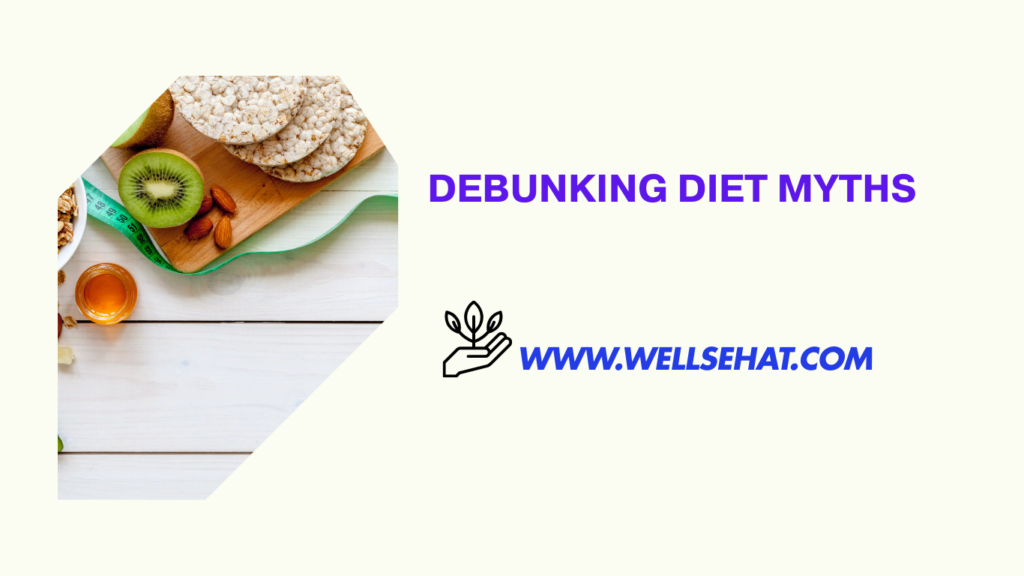As the population continues to confuse information with knowledge, losing itself in the sea of differing diets and the rumors of proper nutrition. From low-carb(“ Atkins” ) to detox diets, most diets are still surrounded by myths that only serve to add to the confusion. The present article shall attempt to demystify some of the existing diet myths by using appropriate facts and data that would help readers avoid getting lost in the confusing world of diets.
Myth 1: Carbs Are the Enemy
One of the biggest misconceptions is that carbohydrates are bad for you and thus need to be avoided altogether. This has been made worse by the low-carb diets like the ketogenic diets that have flooded the market recently. But the studies have proven that not all carbohydrates are the same.
Fruits and vegetables contain complex carbohydrates that should be eaten in large proportions as they contain nutrients and fiber and help to supply energy. Research shows that whole-grain diets can reduce the risk of heart disease, diabetes, as well as some types of cancer. Whereas often people are told to avoid carbs, it is recommended to consume whole grains and minimize intake of refined sugars and processed products.
Myth 2: Eating Fat Makes You Fat
The other traditional myth that is familiar to everyone is that fat consumed through diet will make a person overweight. It gained much attention in the early 1990s, something attributed to low-fat beliefs. But as recent studies have highlighted, the kinds of fats that can be good for our health are fats from avocados, nuts, seeds, and olive oil.
In fact, unsaturated fats are essential to assist in the absorption of vitamins, as well as to support cognitive as well as hormonal processes. They can also enhance satisfaction, thereby giving you a full feeling. The majority of people need to limit their intake of trans and saturated fats while embracing sources of unsaturated fats.
Myth 3: All Processed Foods Are Bad
People today avoid processed foods with extensive knowledge thinking that all processed foods would harm their lives. Although, it is a fact that highly processed foods contain a large amount of added sugars, unhealthy fats, preservatives, and whatnot, not all processed foods are bad for you.
While most people think of those foods as simple and healthy, many of them—frozen vegetables, canned beans, or whole-grain bread, for instance—undergo some sort of processing. The way to get around this is to read food labels and go for the least processed foods that still retain the nutrients. Contrary to completely eliminating all processed foods from your diet, make an effort to include whole nutrient-packed foods into your diet.
Myth 4: Detox Diets Are Necessary for Cleansing
Detox diets are trendy nowadays, as their promoters explain that, they eliminate toxins from the body. But to one’s surprise, the human body has a natural ability to eradicate toxins. Our liver, kidneys, and digestive system play an active role all day to filter out waste and poison from our bodies.
Myth 5: Skipping Meals Helps with Weight Loss
Most people think that skipping meals is effective for weight loss as it automatically leads to fewer calories consumed. However, studies demonstrate that this strategy erodes credibility. It is common knowledge that people who have their meals skipped are most likely to take more food the next time or end up taking the wrong meals.
Read More… Understanding Nutrient Timing How to Optimize Your Eating for Performance and Recovery
Myth 6: Supplements Can Replace a Healthy Diet
Because of the introduction of supplements, many people today believe that it is possible to switch between having rich meals and taking chemical-laden supplements. Although supplements are capable of countering certain shortcomings in nutrient intake, they do not contain the entire spectrum of vitamins, minerals, and phytochemicals of whole food.
Myth 7: You Can Lose Weight Fast with Fad Diets
Fad diets usually come with the claim of incurring quick weight loss through very ‘strict’ methods such as low-calorie intake or improper meal plans. It can be seen that it is possible to lose weight fast through such practices, however, the findings of the research do not support such practices because such tricks are sure to be followed by weight gain.
Conclusion
The concept of diet is surrounded by myths that eventually complicate the understanding of how a person can eat healthily. It means that by clearing up these myths, we will offer a healthier way to approach the topic of nutrition, or at least make it less destructive. There are several tips to keep in mind as you make necessary changes to your diet: everything must be taken in moderation, and the emphasis is made on the quality of foods with the least amount of additives. They should be tried with narrow-mindedness in favor of the latest trends and should focus on realistic changes for better health. It is important to stick with research-based strategies for healthy eating as you go through your nutrition plan.
